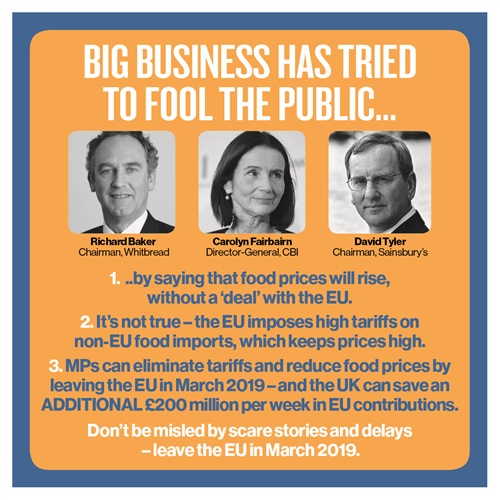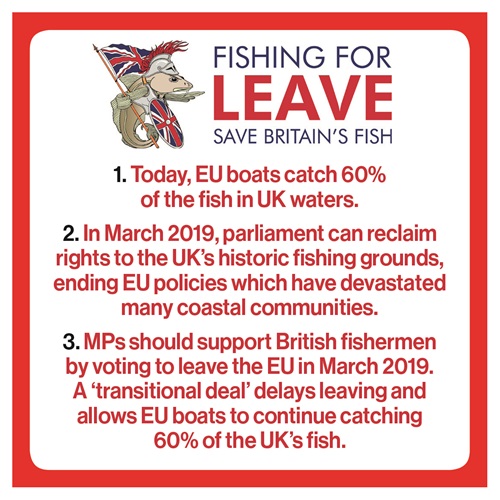Pub operator JD Wetherspoon has today issued a new beer mat (Monday December 4) highlighting its support for the British fishing industry and also accusing business leaders of misleading the public on Brexit.
The 500,000 beer mats will be in use in its 893 pubs across the UK.
Sky News: Tim Martin explains why no deal is better than a deal for food prices
The beer mat states that big business has tried to fool the public by saying that food prices will rise, without a deal with the EU.
It says the statement is not true and that the EU imposes high tariffs on non-EU food imports, which keeps prices high.

And it calls on MPs to eliminate tariffs and reduce food prices by leaving the EU in March 2019 – and states that the UK can save an additional £200 million per week in EU contributions.
Three industry leaders, Whitbread chairman Richard Baker, Sainsbury’s chairman David Tyler and CBI director general Carolyn Fairbairn, are highlighted on the beer mat as proponents of the false claims.
Wetherspoon has also used the beer mat to show its support for Britain’s fishing industry, by backing Fishing for Leave.

It states that in March 2019, parliament can reclaim rights to the UK’s historic fishing grounds, ending EU policies which have devastated many coastal communities.
Additionally it calls on MPs to support British fisherman by voting to leave the EU in March 2019 and says that a transitional deal delays leaving and allows EU boats to continue catching 60 per cent of the UK’s fish.
Wetherspoon chairman Tim Martin said: “ The ‘thundering herd’ of the CBI, big business and most economists got it wrong over the exchange rate mechanism, the euro and the effect of a leave vote.
“Their latest red herring is that we need a ‘deal’ to avoid a ‘cliff edge’, which will dramatically put up food prices.
“This is untrue – parliament can eliminate food tariffs and reduce prices by about 3.5 pence per meal if the UK avoids a deal and reverts to World Trade Organisation rules.
“Big business should be ashamed of its unscrupulous attempt to mislead the public.”
Fishing for Leave spokesman Alan Hastings added : “ Fishing is one of our nation’s finest natural resources. It was sold out to EU control with such devastating consequences for towns synonymous with fishing.
“Brexit gives us a chance to right that wrong and automatically regain control of all UK waters and resources under international law on 29th March 2019 to be like Norway, Iceland and the Faroe Islands.
“This would see the UK regain the 60 per cent of its fish that the EU catches in our waters and see fishing communities rejuvenated by a potential £6.3 billion windfall.”
Appendix 1
Sainsbury's boss David Tyler warns a 'no deal' Brexit would raise the cost of shopping
Tommy Stubbington, 15 October 2017, The Sunday Times
Families will have to pay more for their weekly shop if Britain leaves the EU without a trade deal, the chairman of Sainsbury's has warned.
David Tyler said customs delays and tariffs would add to the costs facing shoppers. His warning comes after Theresa May said she was making plans for a "no deal" Brexit, which would see Britain trading with the EU under World Trade Organisation rules.
"If we don't get a deal and we move to WTO rules, we could face an average tariff of 22% on foodstuffs we import from Europe," Tyler said.
Under current customs arrangements, a lorry leaving Italy early in the morning would be able to deliver to Sainsbury's in time for the food to be on shelves the following day.
"There is considerable worry about wastage," he said, warning that trucks could face delays leaving French ports and again on reaching Britain.
Hauliers have warned that delays in cross-Channel trade could place Britain's supply chain under pressure, potentially leaving supermarkets short of food and manufacturers without vital components.
"The resilience of the supply chain is about one week," said James Hookham of the Freight Transport Association.
Appendix 2
Hard Brexit will increase our prices, retailers warn government
10 October 2016, The Evening Standard
Retailers today warned that families will pay higher prices in the shops if the Government goes for a "hard Brexit".
The British Retail Consortium said goods from clothes and wine to meat would become more expensive unless Theresa May strikes a deal with the other 27 EU countries.
Sterling slipped further against both the dollar and the euro this morning - and one City expert warned grimly that the "markets can strike back" if the Government ignores the fears of the City and business.
In a letter to International Trade Secretary Liam Fox, the retailers said failure to reach a trade deal with Brussels would see tariffs of 12 per cent slapped on clothes from Bangladesh and up to 27 per cent on meat.
Chilean wine would be hit by a 14 per cent levy, although New Zealand lamb could become cheaper
Chairman Richard Baker said stores would struggle to absorb the tariffs themselves, meaning higher prices for consumers. "The retail industry is the UK's biggest importer," he wrote.
David Cumming, head of UK equities at Standard Life Investments, said the Government should pay heed to the financial markets after a week of steady losses by the pound. "I don't think fall in the pound is good news from here," he said, adding: "There's a lot of rhetoric that the market doesn't like."
He told BBC Radio 4: "The markets can strike back if the Government does not listen to business agendas."
Business groups have stepped up pressure since Mrs May used last week's Conservative party conference to signal that she is prepared to have a hard Brexit, sacrificing full access to the European Single Market for the sake of immigration control.
Mrs May was visiting Denmark and the Netherlands today in the latest leg of her tour of EU member states.
But she was badly wounded by a humiliating Tory U-turn over the weekend on a plan to list firms that employ a large proportion of foreign workers. The Government plan to force businesses to reveal how many foreign staff they employ was widely condemned. Education Secretary Justine Greening announced yesterday that companies will not be made to publish the data as suggested by Home Secretary Amber Rudd during the Tory conference.
Ms Greening said the information would be confidential and instead used by the Government to identify skills shortages, rather than to "name and shame" businesses that rely on foreign employees.
Steve Hilton, a former adviser to David Cameron, had suggested that ministers might as well announce that "foreign workers will be tattooed with numbers on their forearms". He condemned the policy as repugnant and divisive.
A study by the British Chambers of Commerce said uncertainty had hit recruitment and investment plans.
Dr Adam Marshall, acting director general, said: "Our data suggests that slower growth is likely in the months ahead."
Carolyn Fairbairn, head of the CBI, said a hard Brexit risked "closing the door" on Britain's traditionally open economy.
This article was written by Joe Murphy from Evening Standard, London and was legally licensed through the NewsCred publisher network.
Appendix 3
The Guardian view on Brexit......
Editorial, 7 July 2017, The Guardian
'.....A deal is better than no deal. No deal would mean a reversion to WTO rules on trade between the EU and the UK. Among other things, it would mean, as Mr Barnier points out, that there would be customs duties of almost 10% on vehicle imports, of 19% on drinks, and an average of 12% on meat and fish. These would be hugely disruptive shocks with major economic and social repercussions. Those repercussions would likely be worse for Britain than the EU. Mrs May would be crazy to take the economic and political risks. But that is where she is still heading.'
Appendix 4
Clegg warns 'hard Brexit' will lead to 22% EU food tariffs
Henry Mance, Political Correspondent, 17 October 2016, Financial Times
Britain will face average tariffs of 22 per cent on its food imports from the EU, unless it remains within the single market or strikes a bilateral trade deal following Brexit, the former deputy prime minister Nick Clegg has warned.
The analysis counters calls from Conservative backbenchers that Britain should fall back on World Trade Organisation rules to strengthen its bargaining position with the EU. The chairman of the foreign affairs select committee, Crispin Blunt, has said WTO rules would provide a "perfectly sound bottom line for the UK in the negotiations".
Food prices hit the headlines last week, when Unilever products, including the spread Marmite, briefly disappeared from the website of retailer Tesco after a dispute over which company should bear the cost of the falling pound.
"It's clear that Marmite was just the tip of the iceberg," said Mr Clegg, a former EU trade negotiator. "A hard Brexit will lead us off a cliff edge towards higher food prices, with a triple whammy of punishing tariffs, customs checks and workforce shortages."
Mr Clegg is calling for Britain to remain within the EU single market and to seek an interim deal based on Norway's status. Theresa May has not ruled out a transitional arrangement with the EU, or contributing to the bloc's budget, as Norway does.
Without a trade deal or interim arrangement, the UK's exports to the EU would be subject to the latter's terms at the World Trade Organisation. Those specify average tariffs of 2 per cent on non-agricultural products, but 22.3 per cent on agricultural products, Mr Clegg said.
The same levies would apply to UK imports from the EU, assuming, as Liam Fox said last month, that the UK would "continue to uphold" the EU's most favoured nation tariffs. Applicable tariffs would include 13 per cent on salmon, 14 per cent on wine, 40 per cent on cheese and 59 per cent on beef. The rates must apply to all countries outside the customs union, unless a free-trade agreement is in place.
In the short term, economists already expect an increase in food price inflation due to the fall in the pound. Mark Carney, the governor of the Bank of England, has said that inflation is likely to run "a bit" above the bank's 2 per cent target. Ruth Lea, a Brexit-supporting economist, has said leaving the EU could lower prices in the medium term, on the premise that Britain will strike trade deals with third companies and the pound will recover.
Philip Hammond, the chancellor, has sought to keep open Britain's membership of the single market, stoking tensions with pro-Brexit ministers who want a clean break with the EU. But his allies rejected one report on Sunday that he was considering resigning over being allegedly marginalised by Mrs May.
Britain's farmers, a plurality of whom are estimated to have backed the Leave campaign, are likely to play a vocal role in negotiations with the EU. Mr Hammond has already promised to replace any lost EU funding until 2020, yet subsidies and market access in the following years remain key issues.